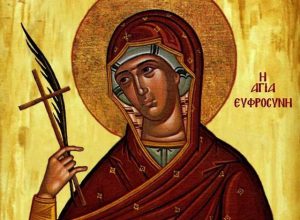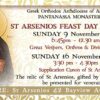
The life of St Euphrosyne is admirable and her way of life uncommon. She is a model of spiritual bravery, purity and chastity. Born in Alexandria in the fifth century, she was an only daughter and very rich. Material wealth, fortunately, did not manage to harden her soul to become selfish and stingy, as it most often happens, but she remained benevolent and merciful. Her parents loved God and loved people, and they managed to give her true wealth of the heart, namely, to inspire love for God and for people.
At the age of twelve she was orphaned of a mother and her father showed greater zeal and diligence towards her upbringing. When she turned eighteen he wanted to marry her to a young man of high social status. But Euphrosyne chose the path of virginity in Christ and her decision was firm and irreversible. For this reason one day she divided her belongings among the poor and left secretly, to avoid her father discovering her and obligating her to return to the world and marry against her will. She changed her clothing and dwelled in a male monastery, changing her name also to Smaragdos. She lived in a male monastery for thirty-eight whole years without anyone knowing her secret. In asceticism and virtue she far surpassed her fellow monastics, with the result that everyone marveled at the divine way of life of Smaragdos, and many struggled to emulate “him”. St Nikodemos of Mt Athos admired her angelic way of life, writing: “It was given to her to shine among the men by her virtues, like a precious emerald (smaragdos) gemstone among other stones. Blessed Euphrosyne appeared like an emerald (smaragdos).”
Often parents, perhaps due to too much love, which is certainly not entirely free of selfishness, insist to impose upon their children their own decisions, in order to be benefited by their children. The legitimate reaction of children, which is sometimes dynamic and contains elements of exaggeration, create family conflicts with societal implications. True love is linked with freedom, and vice versa.
 St Euphrosyne never stopped truly loving her father and praying for him. Her father Paphnoutios appealed to the abbot for comfort in his bereavement, the abbot not knowing that they were related committed him to the care of Euphrosyne, still under the guise of Smaragdos. Paphnoutios received from his own daughter, whom he had failed to recognize, helpful advice and comforting exhortation. Not until she was dying did Euphrosyne reveal herself to him as his lost daughter. After burying her, Paphnoutios gave up all his worldly goods, and became a monk in the same monastery. There, he used his daughter’s old cell until his own death ten years after.
St Euphrosyne never stopped truly loving her father and praying for him. Her father Paphnoutios appealed to the abbot for comfort in his bereavement, the abbot not knowing that they were related committed him to the care of Euphrosyne, still under the guise of Smaragdos. Paphnoutios received from his own daughter, whom he had failed to recognize, helpful advice and comforting exhortation. Not until she was dying did Euphrosyne reveal herself to him as his lost daughter. After burying her, Paphnoutios gave up all his worldly goods, and became a monk in the same monastery. There, he used his daughter’s old cell until his own death ten years after.
It is worth noting that Paphnoutios, her father, is also a Saint and that both father and daughter celebrate their feast on the same day. Inside the male monastery she made a superhuman struggle to live according to Christ. She had to continuously impersonate, but also took great pains to not be outdone in asceticism and spiritual performance by her fellow monastics. And truly, as the sacred hymnographer says, she rejected the weaknesses of a female and became manly, that is, she had a manly mindset. In this way she overcame the difficulties to defeat the various temptations and live with “incorruptible purity and chastity, which is acquired by corruptible people with toil and sweat” (St John of Sinai). St Euphrosyne reminds us, among other things, that if one desires and truly wants to live according to Christ, there is nothing in the world that can deter them. Surely you will encounter temptations and difficulties will come, perhaps faced by people and situations, but if one truly loves the spiritual life, they will be patient and reach their goal, because love “always hopes, always perseveres”, and it devises incredible ways to express itself. For one to live with purity and chastity one must perform great labors and shed much sweat. By their bright example the Saints assure us that this life, despite its difficulties, is lovely. And it hides such joys that it is impossible for the “natural man” to even imagine.




